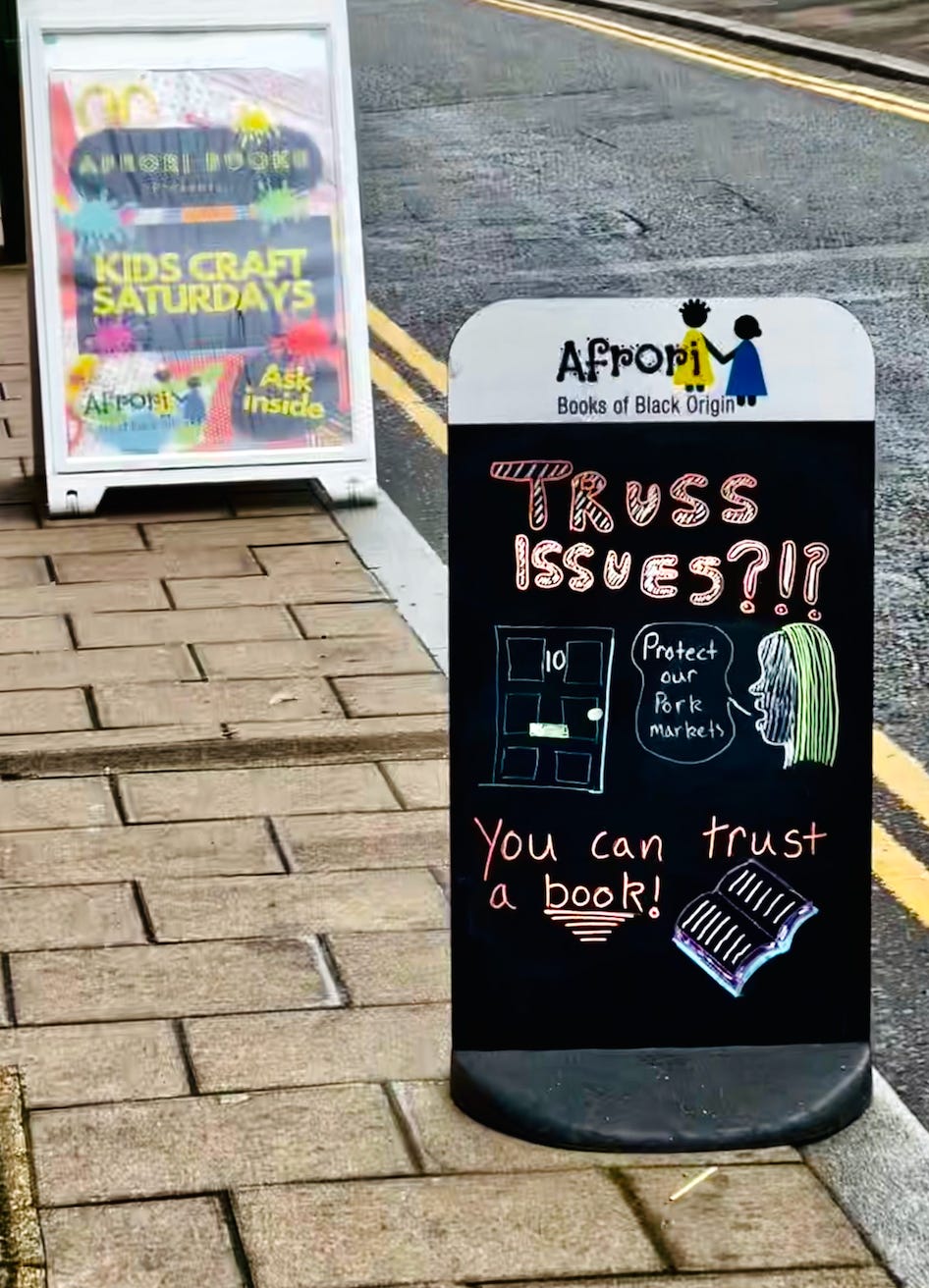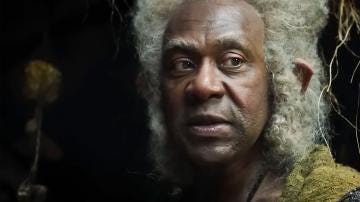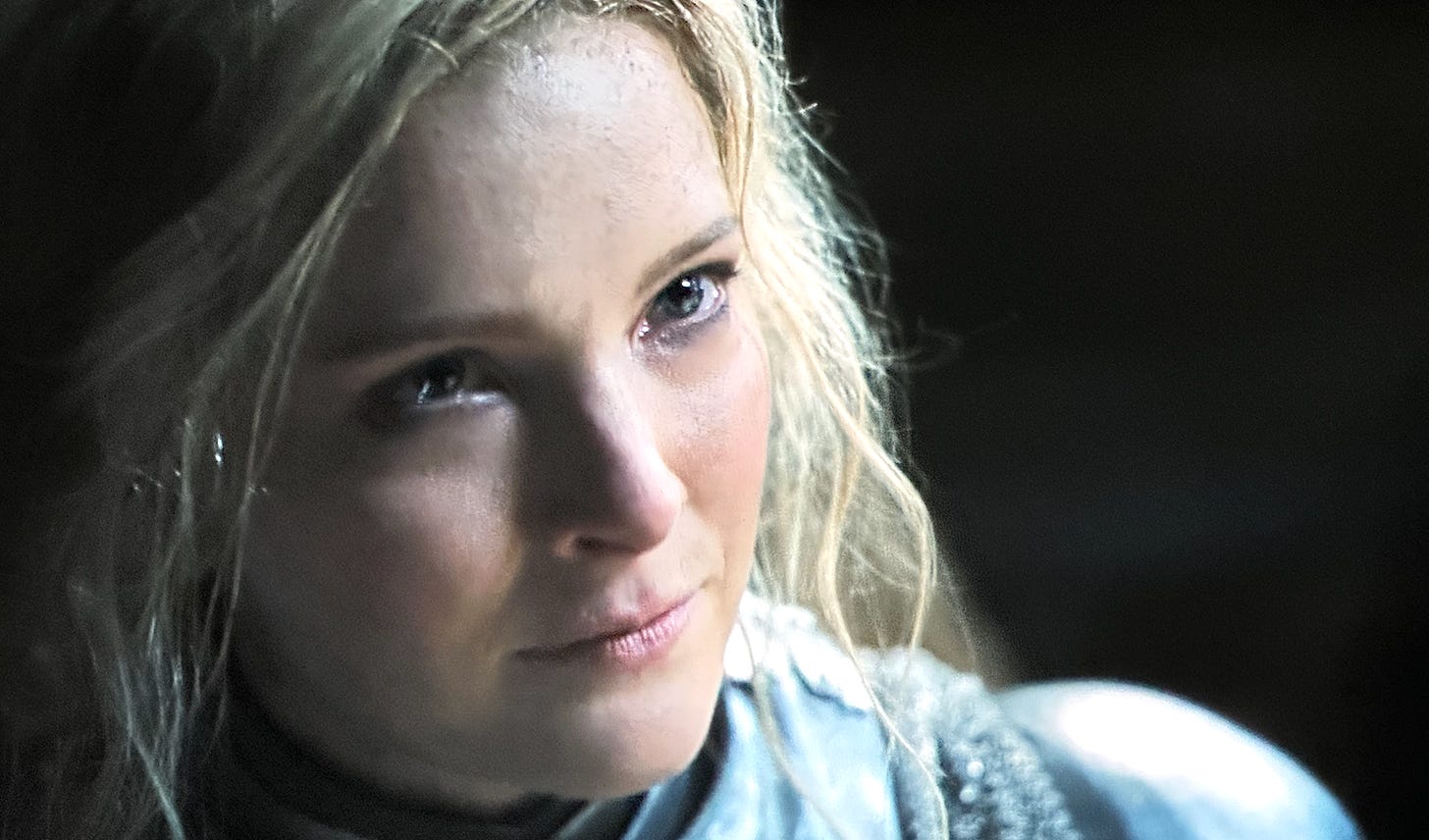Antonym Lightbulb Wonders Edition
Words about words, art made of lightbulb-words and parkour turning off lights

Dear Reader,
Thank you for opening another edition of Antonym, a rapidly–but–lovingly compiled series of intriguing things. Thank you also to each of you who liked, shared and enquired after my wellbeing after last week’s French dispatch (which found me injured and forced to enjoy a day enjoying the gentle delights of a day in a lovely Ariège). I made a full recovery.
I hope you enjoy this week’s morsels…
How did a black man, born on a slave ship, end up a successful merchant, painted by Gainsborough?
This question grabbed the attention of playwright, actor and author Paterson Joseph (famous for playing alpha-boss Johnson in Peep Show):
Watch this video of him from Times Radio on this imperfect heroes and the value of finding stories of black people in Britain.

His passion and the intriguing story of the first black man to vote in England had me literally head straight out and buy The Secret Diaries of Charles Ignatius Sancho on Friday.
Sign of the times
Afrori Books—based in my beloved Lighthouse building in Brighton’s North Laine—has borrowed the Insta-friendly marketing tactic of coffee houses and bars.
Truss-ian roulette
There’s little left to say about the record–breakingly flailing and failing of the latest UK prime minister. I offer only the (bad) pun above, and this optimistic piece from The Economist, which says a Conservative collapse might just save the Union.
Bagehot | Labour’s surge and the Tories’ troubles could refresh the United Kingdom
Those ridiculous(ly safe) e-scooters
One more from The Economist: Nothing makes me sound more like a grumpy old man than an e-scooter whistling past me on the pavement. But…
According to the Royal Society for the Prevention of Accidents, another charity, e-scooters are involved in 0.7 collisions per 1m miles, compared with 3.3 for bicycles and 5.9 for motorbikes.
Paris is a complete turn off
Speaking of delinquent young people doing socially responsible things:
Over the past two years, groups of young athletes practicing Parkour — a sport that consists of running, climbing and jumping over urban obstacles — have been swinging around big French cities switching off wasteful shop signs at night, in a bid to fight light pollution and save energy.
NYT | With Leaps and Bounds, Parkour Athletes Turn Off the Lights in Paris
Nathan Coley and James Lavelle on their creative processes
Charleston’s Small Wonder festival is happening over this weekend. It’s about a twenty-minute drive from where we live, so Mrs M and I headed over to catch a talk close to my heart: Words In Art, a conversation between sculptor Nathan Coley and DJ and producer James Lavelle. Coley’s famous for the deceptively simple installations of words as lit-up signs. Like this one:
And this one:

Lavelle started the legendary Mo’Wax label in the 90s, that brought DJ Shadow and Badly Drawn Big to prominence. He describes himself as a collagist, piecing together samples and found sounds into new music. The two are friends and while their work has similarities—Coley’s short phrases are “found objects” in the same way that riffs or beats are to Lavelle’s soundtracks and dance music—they are different. Different enough to make an hour’s eavesdropping on their conversation a rewarding experience.
Here are a couple of things that stuck with me:
The jarring shift from discovery to making: This seems the same whether you’re writing in long-form, assembling new sounds, or making a sculpture. The moment where a phrase or a rhythm or a theme shifts from being something emerging from research into a final work is hard. It’s a phase transition—gas to liquid, liquid to solid—that happens gradually and then all at once.
The process of creativity: There’s an ease and playfulness to the research-gathering phase of working, but the moments that small things become considered things and then become part of a process of making are significant. Both Lavelle and Coley were aware of these, the latter described the steps as:
Always listening and looking at words that may one day become a sculpture…
Some words make it into a notebook…
After a while, some of those words may make it on to his studio wall…
Once on the studio wall they are considered, made and remade in different ways…
The final work is constructed, often in a form of fairground-like light-bulbs in a font he had made specifically for the series more than a decade ago. There is a lot of painstaking attention to detail at this point — the spelling, the alignment, the shape of what is, he reminds his team, a picture.
Finally, the work takes it place in the world for a while—versions of a work will be toured. For instance, “A PLACE BEYOND BELIEF” has been shown in the Rathfinny Vineyard, a few miles from Charleston, and in “a former Nazi swimming pool”. The first of his works in this series—“THERE WILL BE NO MIRACLES HERE”—was appropriated simultaneously in Scotland by the Presbyterian church and the Scottish Humanist Society, which delighted him as “both of them were getting it wrong” but from completely opposite perspectives.
If you’ve not been Charleston, it’s a lovely place. The gardens are worth the trip alone, but the art will blow your mind. It’s also a working farm. The talk was held in a converted barn and there was the drone of milking machines in from next door as a surreal accompaniment to the first half of the session.
This week I’ve been...
Watching
Er, Lord of The Rings Rings of Power, obvs. Based on their performances I want Lenny Henry to be our king and Morfydd Clark to be UK PM ASAP. She would take no crap. He would permit no unkindness.
Re-watching the epic Chinese neo-propaganda war film The Eight Hundred. A bizarre setting and epic scale make it a disorientatingly impressive watch.
Reading
I finished Eleven: Last Man Standing. Five star action–thriller. I’ll be reading the next one when it comes out next year. It’s a book that knows what it is and what it’s for and respects the sub-genre it belongs to. It was so much fun, and well-written too.
Then I’ve moved back to Le Carré for some literary espionage roughage with The Secret Pilgrim, one of the later Smiley books. The old spy is called on by someone at Saratt, the British spy school in the Le Carré universe, to give a lecture. The theme of so many Le Carré’s books is being and moving between different versions of ourselves. Smiley tells a rapt audience of junior spies:
‘By being all things to all spies, one does rather run the risk of becoming nothing to oneself,’ he confessed sadly. ‘Please don’t ever imagine you’ll be unscathed by the methods you use. The end may justify the means – if it wasn’t supposed to, I dare say you wouldn’t be here. But there’s a price to pay, and the price does tend to be oneself. Easy to sell one’s soul at your age. Harder later.’
With lovely serendipity, another quote on this theme came up yesterday in Readwise the app that plays a few passages I’ve highlighted in books back to me each day. It’s from The Perfect Spy, Le Carré’s masterpiece, and clearly his most autobiographical (the protagonist has a conman Father, just like Le Carré did).
So there’s yet another Pym for you, Jack, and you had better add him to my file even if he is neither admirable nor, I suspect, comprehensible to you, though Poppy knew him inside out from the first day. He’s the Pym who can’t rest till he’s touched the love in people, then can’t rest till he’s hacked his way out of it, the more drastically the better. The Pym who does nothing cynically, nothing without conviction. Who sets events in motion in order to become their victim, which he calls decision, and ties himself into pointless relationships, which he calls loyalty. Then waits for the next event to get him out of the last one, which he calls destiny.
It’s a melancholic but recognisable sketch of how our minds retrospectively re-tell our stories to ourselves, with the hero making choices, triumphing or being the victim of uncontrollable circumstance or dark forces if they stumble. It’s an artist painting this picture for us, but there’s science behind the ideas. Selves are made from moment to moment, and memories called into action as proof points for a story of ourselves that is bearable, sometimes admirable. In reality, emotions make decisions and our conscious minds justify them. Moral choices come in seconds from the gut and then are laboured over for hours or even years by a conscious mind desperate to keep up the appearance of mastery or some semblance of control in the world. Like a calculator strapped the forehead of a frenzied bull, that wants us to believe that it is making the calls on what it destroys next.
Too good not to share
Podcasting business: From Simon Owen’s newsletter: Is Spotify's Podcast Exclusivity Strategy Working? (See also Betteridge’s Law)
Mental Health Is Political, by UCLA professor, Danielle Carr. A provocative and useful examination of medicalisation and the concept of reification.
If you do a four day working week you sleep more: Employees Who Shift to 4-Day Week Devote New Free Time to Sleep
Workers who shifted to 32-hour workweeks logged 7.58 hours per night of sleep, nearly a full hour more than when they were keeping 40-hour workweeks, according to lead researcher Juliet Schor, a sociologist and economist at Boston College who is tracking over 180 organizations globally as they shift to truncated schedules through six-month pilot programs.
[…] “Sleep and work are sort of in competition with each other,” according to [Christopher Barnes, a management professor at the University of Washington’s Michael G. Foster School of Business], “and when you trade sleep for work, it’s problematic. You sacrifice your health and have bad work outcomes.” The consequences of low sleep include unethical behavior, lower work engagement, less helpful behavior toward colleagues, more abusive and aggressive leadership tendencies, he said.
A List of Reasons Why Our Brains Love Lists A List of Reasons Why Our Brains Love Lists
And that’s all…
Unbelieveably I have a whole tranche more things I’d like to share, but as they are all marketing and business related I’m going to divert them into my day-job and perhaps another newsletter. Let me know if you’d be interested in that…
Thank you for reading!
Antony










